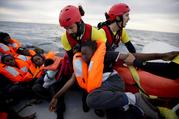- California Assembly OKs highest minimum wage in nation
- S. Korea unveils first graphic cigarette warnings
- US joins with South Korea, Japan in bid to deter North Korea
- LPGA golfer Chun In-gee finally back in action
- S. Korea won’t be top seed in final World Cup qualification round
- US men’s soccer misses 2nd straight Olympics
- US back on track in qualifying with 4-0 win over Guatemala
- High-intensity workout injuries spawn cottage industry
- CDC expands range of Zika mosquitoes into parts of Northeast
- Who knew? ‘The Walking Dead’ is helping families connect
Europe plans to cut migrant influx by working with Libya
VALLETTA, Malta (AP) — European Union leaders at a summit Friday devised a plan involving largely lawless Libya to try to shut down the smuggling of hundreds of thousands of migrants from North Africa across the Mediterranean Sea to Europe. 
The vast human tide has helped boost anti-Europe populist parties across the continent that have exploited the immigration crisis to gain voters.
But even as EU officials meeting in the Mediterranean island nation of Malta were voicing hopes that the strategy would help stop the loss of thousands of lives yearly when flimsy trafficking boats from Libya flounder or sink, concerns arose that the plan risks seeing thousands of people marooned in inhumane conditions in Libya.
Much of the plan’s success will depend on if Libya can be helped by Europe to deter smugglers from operating along its poorly patrolled coastline. That’s a big unknown, given that the internationally-backed Tripoli-based government only controls part of the sprawling country. Libya is beset by rival governments, militias and tribal factions that were unleashed in 2011 after the ouster and slaying of longtime strongman Moammar Gadhafi.
“Naturally, we’re hoping for results,” Italian Premier Paolo Gentiloni told reporters Friday. “There won’t be any miracles, but better management and reduction of illegal migrants are what we’re working toward.”
He said if the plan can cut down on the hundreds of thousands setting off from Libya, it will also reduce the tragedies in which thousands of migrants die every year in the Mediterranean – including at least 5,083 last year.
In the last few years, Italy’s coast guard has coordinated the rescues of hundreds of thousands of asylum-seekers and other migrants who were then brought to safety on Italy’s shores. Most don’t want to stay in Italy but hope to reach families or find potential jobs in Germany or other wealthy northern European countries.
In March, the EU struck a deal with Turkey to stop huge number of Syrians, Iraqis, Afghanis and others heading from Turkish shores toward Greece and then overland toward northern Europe. That arrangement involved EU funds of some 3 billion euros ($3.5 billion) for Turkey, in exchange for that country keeping the migrants within its borders and caring for them.
“The Libyan government doesn’t have the same control as (Turkish President Recep) Erdogan of his territory. We can’t expect the situation will change suddenly” in Libya, Gentiloni cautioned.
German Chancellor Angela Merkel conceded that Libya doesn’t have the needed stability to control all of its territory.
But citing an aid and cooperation deal that Italy signed Thursday with Libyan Prime Minister Fayez Serraj, Merkel said Europe would help by continuing to train the Libyan coast guard and would help Libya protect its southern border.
Migrant trafficking routes in North Africa pass through Niger then cross into Libya across the Sahara Desert.
The EU will also work to make sure there are better reception conditions for migrants. Voluntary returns will be stepped up, and the EU will get more involved with neighboring North African nations including Algeria, Tunisia and Egypt to contain the inflows of migrants. Brussels will provide an additional 200 million euros ($215 million) for the plan.
But there are deep concerns that migrants could become trapped in horrific conditions in Libya if the trafficking route is cut off.
“The EU is yet again outsourcing its responsibility to protect the rights of migrants and refugees with no guarantees about what will happen” to them if they are stuck in Libya, said Ester Asin of the Save the Children charity.
Doctors Without Borders director general Arjan Hehenkamp said the EU’s plan shows that it is “delusional about just how dangerous the situation in Libya really is.” The organization’s boats are involved in sea rescues, and Hehenkamp said the survivors have recounted starving in Libyan detention centers and other abuse while in the North African country.
U.N. High Commissioner for Human Rights Zeid Ra’ad Al Hussein called not sending people back to countries where they may face torture, persecution or threats to their lives the “cornerstone of international human rights and refugee law.”












jelly gamat walatra
August 10, 2017 at 1:10 AM
Yes, the information I was looking for. Thank you cara menyembuhkan penyakit jantung koroner
INEM
October 16, 2017 at 12:51 AM
I like your all post. You have done really good work.
JUDI POKER
kelly
November 22, 2017 at 3:27 PM
Very nice and always successful.
This is a very good article.
I’m waiting for you the other article.
togel online